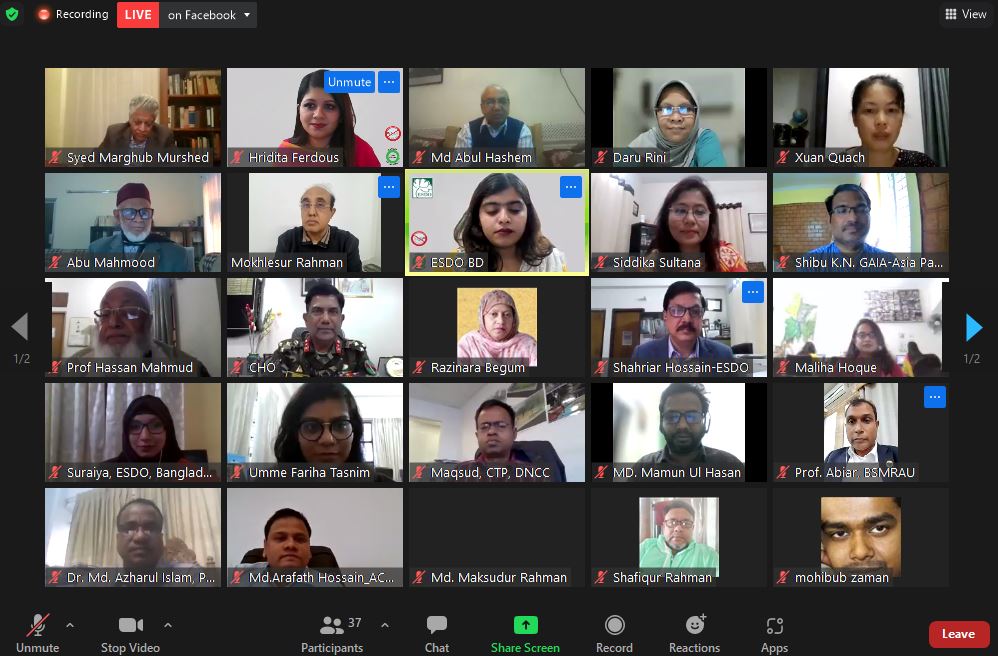Adapting Zero Waste principle is essential to sustainable waste management!

Landfills: Prime Hotspots of Pollution & Health Hazard
Dhaka 13th February 2022: Environmentalists and experts have called for a move of public-private-community partnerships to manage waste. The call was made as part of a high-level policy dialogue on “Zero Waste Communities for Sustainable Waste Management” organized by the Environment and Social Development Organization – ESDO virtually.
Participants expressed concern over the source of pollution from waste landfills and said that landfills is the unavoidable source of environmental pollution and the cause of health risks. So far, the approach to solid waste management in Bangladesh has been top-down, technocratic and disconnected from end-users. Experts pointed out that Bangladesh needs a zero-waste movement, based on public-private-community partnerships to manage its waste. They stated that adaptation of the zero-waste principle is essential for sustainable waste management.
According to ESDO presentation, In Bangladesh, inadequate collection and uncontrolled dumping or burning of solid waste are still an unfortunate reality, affecting public health and polluting the environment. Waste Atlas states that only 37% of Bangladesh’s huge volume of waste (about 22.4 mil tons/year) is collected by the municipalities, most of which pile up in landfills or unregulated dumpsites. These practices have led to critical challenges such as water pollution, air pollution, soil pollution, blockage in drains causing floods, food contamination, malodor in public places, and missed economic opportunities from recycling.
Md. Moniruzzaman, Additional Secretary, Ministry of Environment, Forest and Climate Change graced the event as special guest. He stated “In the Solid Waste Management Rule 2021, waste segregation and reuse has been emphasized. We hope that with the spontaneous participation of the community, we will be able to have a sustainable waste management system,” he added.
Syed Marghub Murshed, Former Secretary of Bangladesh and Chairperson of ESDO said that Several success stories of community participation across developed and developing countries have strengthened the view that city corporations cannot work in isolation and require active participation of all the stakeholders to manage waste.
According to one of the guest speakers, Mr. Shibu K Nair, Coordinator, GAIA India, “Municipal solid waste management is becoming exceedingly challenging in Asian cities, but when we look at the nature of waste, we see that a large percentage—typically more than 50% is organic. The significant proportion of organic waste represents an excellent opportunity for waste management. If organic waste is correctly separated and managed separately, more than half of the problem is solved. That implies we will indeed have achieved half of the journey to Zero Waste.”
One of the guest speakers of the event, Brig Gen Md. Zobaidur Rahman, Chief Health Officer, Dhaka North City Corporation stated that Waste disposal sites that are poorly maintained act as breeding grounds for disease vectors and contribute to global climate change by emitting methane gas. To control this situation City Corporation along with community people needs to come forward and work together.
Guest of Honor, Md, Mokhlesur Rahman, Former Additional IGP of Bangladesh Police emphasized on building Zero Waste Community for achieving a Sustainable Waste Management System in Bangladesh.
ESDO’s Secretary General Dr. Shahriar Hossain said that A zero-waste strategy needs to ensure everyone has access to tools to reduce, reuse and recycle waste where they live, work and play. This allows everyone to participate in protecting our environment. Zero waste approach will build a circular economy, where “waste” is a resource for something new. This will also create good, green jobs as resources are endlessly recirculated through our economy instead of being used once and then disposed or destroyed.
Among other guest speakers, Quach Thi Xuan, Coordinator, Vietnam Zero Waste Alliance and Dr. Daru Setyarini, Waterkeeper Asia Pacific, Ecoton shared some success stories of small communities who are gradually moving forward Zero Waste lifestyle which clearly underlines the fact that Zero Waste is quite possible.
Among the other speakers are Siddika Sultana, Executive Director of ESDO, Ms. Razinara Begum, Director, DoE, respected faculty members from different universities and different electronic and print media journalists were present at the event. A Thematic presentation presented by Hridita Ferdous, Assistant Program officer, ESDO.
All the gaps in the present waste management system can be solved simply by building zero waste communities as our current culture of consumption is unsustainable. Extracting raw materials from natural spaces requires large amounts of energy and causes pollution, whether it is logging a forest, mining for minerals or drilling for oil. In contrast, a zero waste approach conserves natural resources and reduces pollution from extraction, manufacturing and disposal.
About ESDO
Environment and Social Development Organization- ESDO is a non-profit and non-government organization based in Bangladesh. It is an environmental action research group dedicated to a toxic-free, zero-waste planet. ESDO is working relentlessly to ensure biological diversity since its formation in 1990. It is the pioneer organization that initiated the anti-polythene campaign in 1990 which later resulted in a complete ban of polythene shopping bags throughout Bangladesh in 2002. From then ESDO is tirelessly working for building a pollution free environment in Bangladesh. ESDO has recently launched a project titled “Building Zero Waste Communities for a Pollution-Free Environment in Bangladesh” which focuses on establishing a Zero Waste community model towards ending environmental health risks and community wellbeing as well as accelerates the circular economy in Bangladesh.
For more information please contact:
Hridita Ferdous
Assistant Program Officer – ESDO
Email: info@esdo.org
Mobile: +8801726053420


